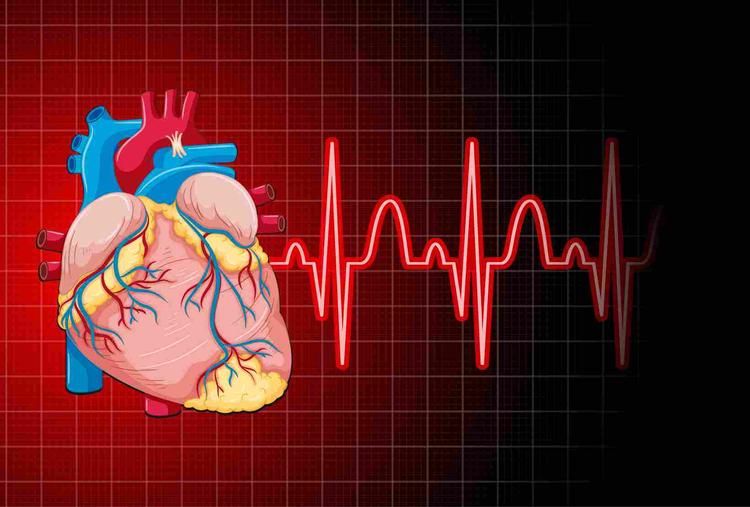Cold weather might affect your heart - Here is the list of the top 5 tests for you and your loved ones

Medically Reviewed By
Dr. Ragiinii Sharma
Written By Prekshi Garg
on Jan 24, 2023
Last Edit Made By Prekshi Garg
on Mar 17, 2024

Cold weather and heart disease - the connection
The cooler temperatures are loved by many, but for many people, drops in the temperatures can affect their overall health, especially heart health. Many people do not know about the physical stress of vigorous exercise and its potential dangers when going outdoors in cold weather. You need to understand why does cold weather cause heart attacks, especially among winter sports enthusiasts, who can suffer accidental hypothermia. It is a condition in which the body temperature falls below 35 degrees celsius or about 95 degrees F . it occurs when your body cannot produce enough energy to maintain the internal body temperature warm enough, and seriously it can kill you. Not only cold temperatures, high winds, rain, and snow can also steal body heat.
Ways in which cold weather affects the heart
Exposure to cold weather can increase the risk of heart attacks because the blood vessels respond to low temperatures by constricting, leading to elevated blood pressure and reduced circulation, putting strain on the heart. Winter and heart attacks are connected. A heart attack occurs when something creates a blockage in the blood vessels, like a blood clot, that causes sudden disruption to blood flow to the heart. You must take heart care in winter as doctors classify heart attacks as an emergency as they deprive the body of oxygen and cause sudden death. You need to get all heart tests done at the best pathology labs in India.
And seek immediate medical attention if you find any heart attack symptoms. It is found in many studies have found a link between winter and heart disease. During cold weather, the heart needs to work harder to keep a person warm and cold weather affects the heart and causes:
- Increase in blood pressure
- A higher heart rate
- A higher oxygen demand
- It thickens the blood and leads to blood clotting
Winter care for heart patients is vital as people may experience more adverse effects from a temperature drop, like arterial stiffness and high blood pressure. All factors collectively put further strain on the heart and increase the risk of the attack. Also, respiratory tract infections are more severe and spread quickly during winter, which triggers cardiovascular heart and heart attacks.
Cold weather affects the circulatory system and the heart.
Why does cold weather cause heart attacks? It is a matter of confusion and concern. The cold weather affects your heart in many ways as your circulatory system changes in response to the low temperatures. Also, people might be less active during winter and choose to stay inside to relax and keep warm. Let us discuss the effect of cold weather on the heart and circulatory system :
1. Narrow blood vessels
When a body gets exposed to temperatures that induce shivering, blood supply shunts from the skin to internal organs, and blood leaves veins to organs to keep them warm; during this time, blood vessels constrict to help conserve the body heat, which not only raises BP but also creates a narrow space for blood to circulate. During exercises or any physical activity, blood vessels open to give the body extra oxygen required to do work. But during winners, blood vessels shrink, making it hard for blood to get to the heart. This is a matter of concern if you already have plaque buildup in blood vessels. The time cold shrinks vessels if they are partially blocked, it is more likely that blood cannot get to your heart and the rest of the body parts, leading to a heart attack. This solves the confusion of many who think why heart attack comes in winter. Also, many studies suggest that going between the warm inside and freezing outside can make that plaque buildup bigger and less stable, making a person more prone to heart attacks and other heart problems in winter.
2. Elevated blood pressure
Blood pressure is the amount of pressure within your arteries, and in general, it is higher in the winter and lower in the summer. It is because of the low temperatures in cold weather that cause blood vessels to narrow temporarily. It elevates BP because more pressure is required to force blood through narrowed veins and arteries. It is also affected by a sudden change in weather patterns. Cold constricts the blood vessels, so your heart must work harder to get blood. It is OK to have a temporary increase in blood pressure, but you need to take care of it if you already have high BP numbers, leading to blocked arteries that make you more prone to heart attack and stroke.
3. Increased pulse rate
Studies show increased common health problems in the winter, including heart attacks. It is expected that your heart beats faster in winners as cold affects your heart rate because of the temperature drop. Your heart works harder to keep your body warm, and this causes your heart rate to elevate. While a fast heart rate is not a symptom of heart attack or heart disease, it indicates that your heart is working too fast and hard and you need a rest or a break. Heart rate is greatly affected by exposure of the body to cold air, but it elevates when the hand is dipped in ice water or when extremely cold air is inhaled. Cold air generally causes a slight increase in heart rate in the range of five to ten beats per minute.
How to reduce the risk of heart attacks during winter?
If you still need clarification about whether cold weather affects the heart, then yes, it affects the heart badly. So it's best to avoid exercising outdoors when it is particularly cold. There are numerous exercises you try out indoors that help to boost your mood and help to keep your heart health optimum. If you have a heart condition or are of an older age group, you take extra care to prevent common health conditions during the winter season. You must follow steps to stay warm and look after your immune system; it is the best way to quick recovery even if you have any winter issues.
How to protect my heart during cold weather months?
Heart attacks can occur anytime, but there is evidence that there are more chances of having them during cold winters. A fall in body temperature, known as hypothermia, can lead to heart attack, heart failure, and more. Winter is peak flu season, and people should follow ways to prevent catching illnesses that make them more prone to heart attack and stroke.
There are many ways to protect your heart during the cold winter months:
1. Manage your heart or circulatory condition
The heart needs to work harder in cold weather; thus, many common health problems in the winter also come without warning. Taking care of your heart and managing the underlying conditions is vital. These conditions make you more prone to heart problems if you have a cold in winter. The best way to support your heart health is by taking medication on time and following a schedule, and getting a repeat prescription will help.
The flu is more common during winter and can cause severe health complications. You're more at risk if you are OLDER and have an existing heart condition, but there may also be other reasons.
Fuel your body with heart-healthy foods
Like all organs, the heart also needs extra care. To keep your heart healthy and to take proper care, include heart-healthy foods during cold weather.
- Include whole grains like oats, buckwheat, brown rice, barley, and quinoa, as all are fibrous foods overfilled with nutrients.
- Consume Omega-3 fatty acids, fiber, and phytoestrogens in flaxseeds as they support heart health.
- During cold weather, increase your intake of citrus fruits like oranges, lemons, oranges, tomatoes, and amlas because they suit your heart.
- Take root vegetables like carrots, sweet potatoes, turnips, and beets.
3. Keep moving
Being overweight strains your body, heart, and immune system and may make it less effective at fighting infections. Heart health is vital during winter, and staying fit is the best you can do. Exercising can be harder in the winter as a fall in temperature can make us feel less motivated. However, there are many exercises and activities that you can do indoors, like yoga and meditation, and you can also do chair-based exercises.
During the winter season it is the most common for people to have a higher range of health risks as a drop in temperature can impact your heart in many ways you may never expect. Heart attacks are among the most common health problems in winter due to contraction in blood vessels and increased blood pressure. During the winter season, your heart has to work extra hard to maintain a healthy body, and if your body temperature drops below 95, it can severely affect your health. Acute chest pain is the most common symptom of heart attacks, and it is vital to take heart care in winter to prevent it. The onset of cold temperatures can pose problems in older adults; thus, precautions should be taken when temperatures drop. It is best to consult your healthcare provider to get checked and to undergo a test to get warned. Book your appointment at Redcliffe labs to get all heart tests done, as it provides a healthy heart package that comprises 59 tests to ensure cardiovascular wellness and avoid associated risks.
Five tests to get your heart checked
Why heart attack comes in winter is a common question for many. Heart attack is common during winter months. If you experience any unusual stress or discomfort, like chest pain, when in a cold climate, it is best to consult a doctor, preferably a heart specialist, without delay. Also, avoid placing any stress on the heart until you have been told that you are not in danger of a heart attack. It is best to visit the best doctor to get a heart checkup. Redcliffe labs are among the best labs that offer many tests to determine severe issues. The top 5 tests to get your heart checked are :
1. Lipid profile
It is a lab test to determine the level of lipids like bad cholesterol, good cholesterol, triglycerides, VLDL, and HDL in the body. If the cholesterol level is high, it forms plaque along the sides of the blood vessels and constricts it, making blood flow difficult, leading to chest pain, high BP, heart stroke, etc. A lipid profile test is the best way to prevent heart attacks in winter. The test is a simple profiling done to measure the lipid levels that help to evaluate your health and take preventive measures against a health condition. The test is done after fasting for at least eight to twelve hours overnight; if the test values are borderline or above, you need to follow strict guidelines given by doctors.
2. C-reactive protein
The human body produces C-reactive protein when there is something strapped to become inflamed inside. If a doctor finds CRP in your blood, they recommend the test be done to know if inflammation exists. If your arteries are inflamed, you might be at risk of heart disease, heart attack, and stroke. CRP can also be considered to predict the chances of having heart disease. High levels of C reactive protein are linked with a three times greater risk of a heart attack. It is a simple blood test done at Redcliffe labs which is done at the same time your cholesterol is checked.
3. Troponin test
It is a test to measure the levels of troponin T or troponin I proteins in the blood. These proteins are released when the heart muscles have been damaged and occur with a heart attack. A greater amount of troponin indicates greater damage to the heart. The reason to perform the test is to see if a heart attack has occurred, and your doctor will order this test if you have chest pain or any other signs of a heart attack.
4. Electrocardiogram
An electrocardiogram is a test ordered by the doctor if he wants to check your heart's rhythm and electrical activity. During the test, sensors are attached to the skin and are used to detect the electrical signals produced by the heart every time it beats. These signals are then recorded by a machine and looked at by the health provider. It is suggested because owing to your symptoms, the doctor thinks that you might have a problem with your heart. It is pretty safe and painless at Redcliffe labs.
5. Cardiac profile test
A cardiac profile is a comprehensive panel of tests done to determine the overall functioning of the heart. By looking at certain enzymes, the concentration of fats, and the composition of urine and blood, it will become easier for doctors to evaluate overall heart health. It is a simple test done at Redcliffe labs that helps doctors determine your heart's condition and identify the development of coronary heart disease. This test is among the best for heart care in winter to prevent any emergency. The test includes HsCRP (High Sensitivity C Reactive Protein), Apolipoprotein B/A1 Ratio, Apolipo-A1, Apolipo-B, Lipoprotein (a), and more than test it is functioning on varied grounds. It gives the best health indication of how well your heart is.
Other Preventive Heart Packages For Heart Health:
- Heart Day Special Package - Essential: With 92 different parameters, the package offers a comprehensive cardiovascular health assessment, focusing on early detection and personalized risk evaluation. It includes essential tests like Complete Blood Count (CBC), Erythrocyte Sedimentation Rate (ESR), HbA1C (Glycosylated Haemoglobin), KFT, LFT, Lipid Profile Test and Glucose Fasting to identify heart disease risk factors. These tests provide a brief overview of your heart health, allowing for timely intervention and management.
- Heart Day Special Package - Advance: As the name says, this package will take your heart health assessment further. In addition to the tests included in the Essential package, it consists of a Vitamin B12 & Vitamin D 25 Hydroxy for a more detailed heart and health evaluation. This advanced test provides valuable insights into your heart's performance, helping to detect potential issues (if any) and enabling one to take proactive measures in time.
- Heart Day Special Package - Comprehensive: For the most thorough cardiovascular health evaluation, the Comprehensive package offers 98 tests. In addition to all the tests included in the Essential and Advance packages, it includes Lipoprotein (a) & Homocysteine Test to assess your risks of developing cardiovascular diseases.
So, choose heart health, choose Heart Test with Redcliffe Labs today.
FAQs
1. Can be too cold trigger a heart attack?
Cold weather can make you more prone to heart attack and circulatory problems like heart strokes.
2. How does a person feel during a heart attack?
A person feels discomfort in the center or left side of the chest that lasts for more than a few minutes, and it goes and comes back again.
3. Can a cold shower damage your heart health?
Submersion of the body in cold water in the shower or jumping in a cold pool can increase a person's risk for heart complications.
4. Is hot water suitable for the heart patients?
It is one of the best winter care for heart patients and all others who wish to have heart care in winter.
Conclusion
Winter and heart problems are interconnected as your heart has to work twice as hard to pump oxygen throughout the body to keep you warm. The cold temperatures cause the arteries to constrict, which restricts the flow of blood. Due to this, more chances of developing blood clots and having a stroke or heart attack are higher during winter. As the temperature starts to fall, a person's blood pressure and cholesterol start shooting up, making them more prone to heart diseases. To take care of yourself and prevent health problems in winter, you must visit your doctor to get a proper checkup. Your doctor will order you to take a test to determine heart health. Book your appointment to get a test done at Redcliffe labs. The lab is among the best pathology labs that offer a healthy heart package. Redcliffe Labs ensures to send precise and timely reports following the highest standards to maintain quality. Also, home sample collection is also available for the diagnostic tests as per your preference.



